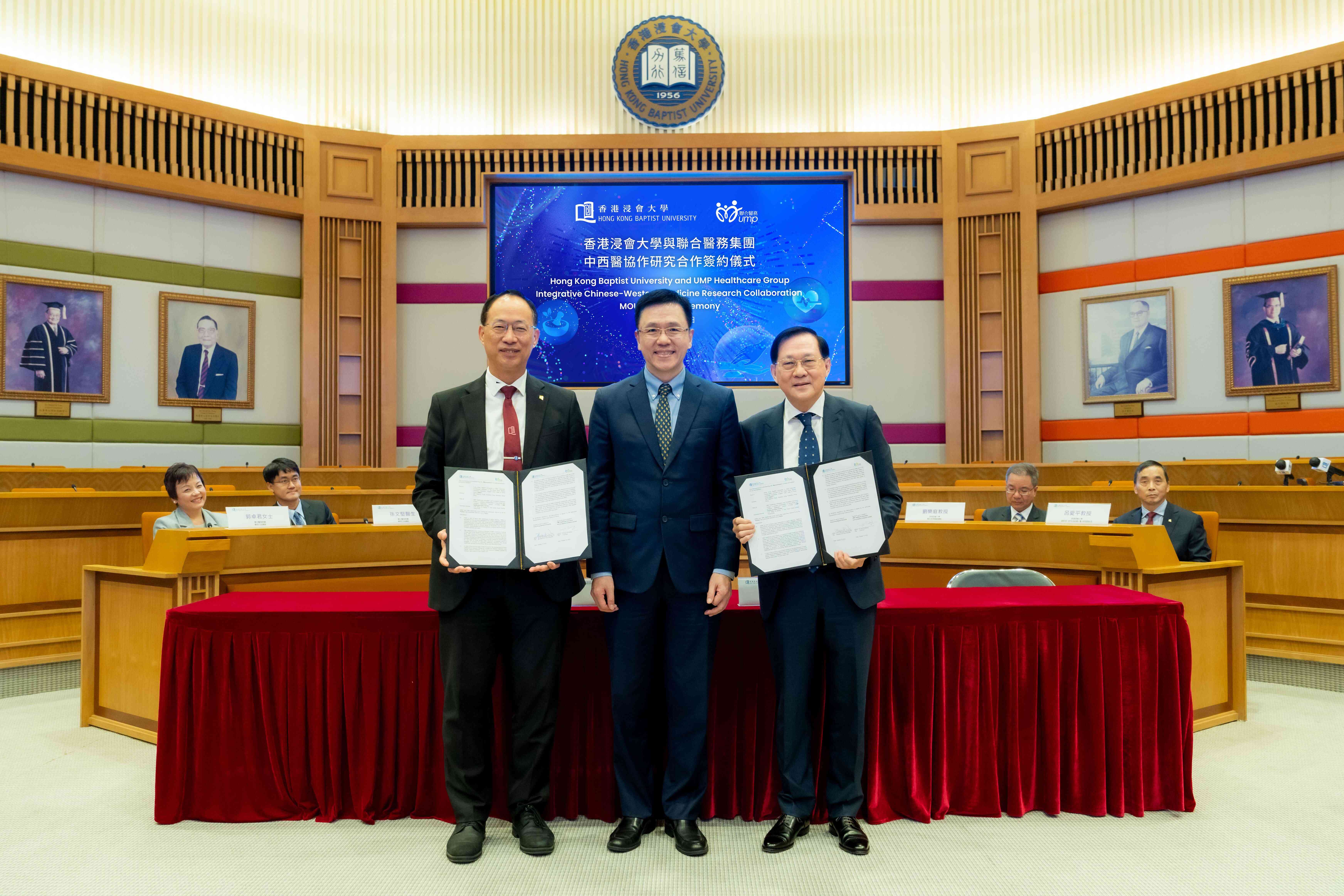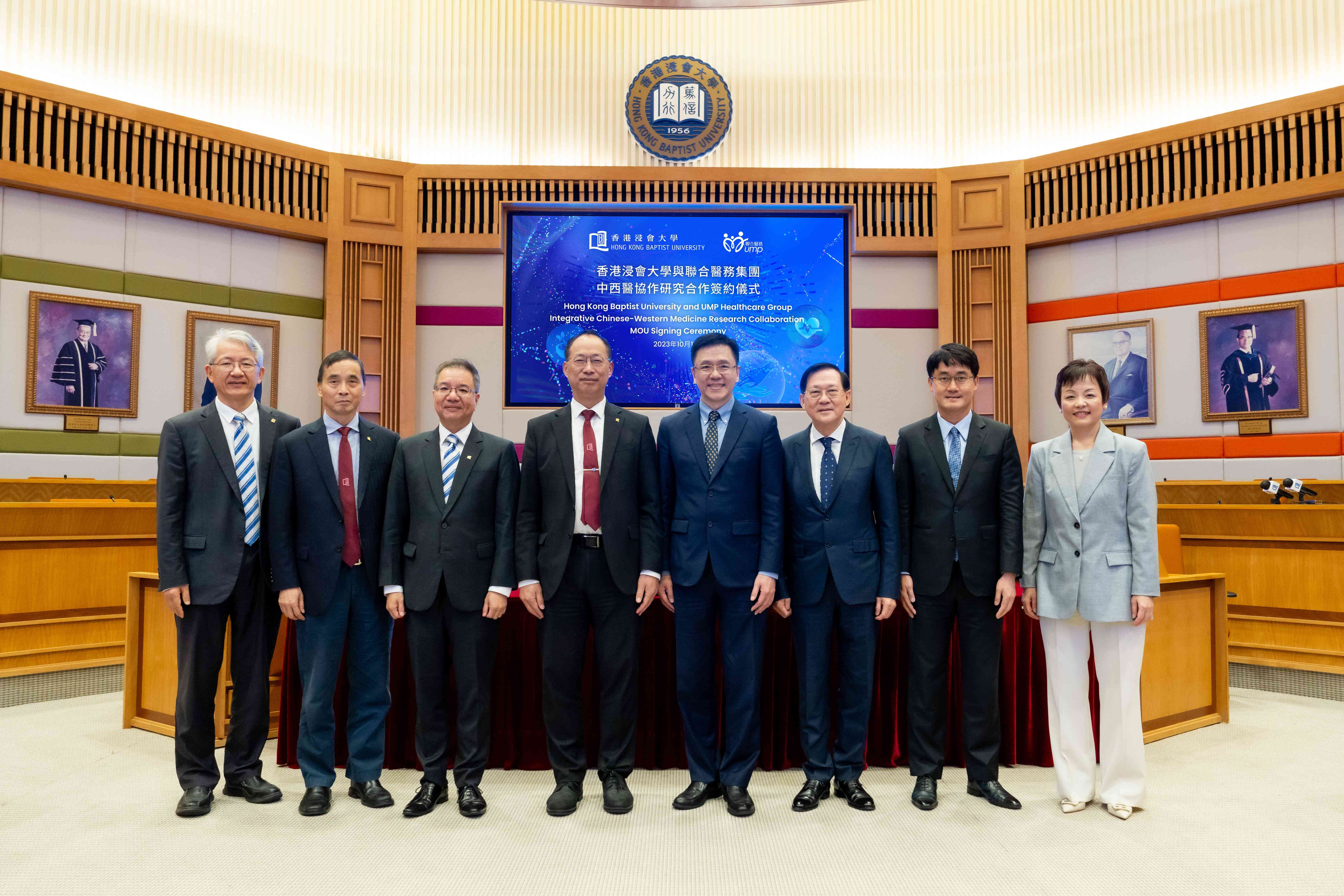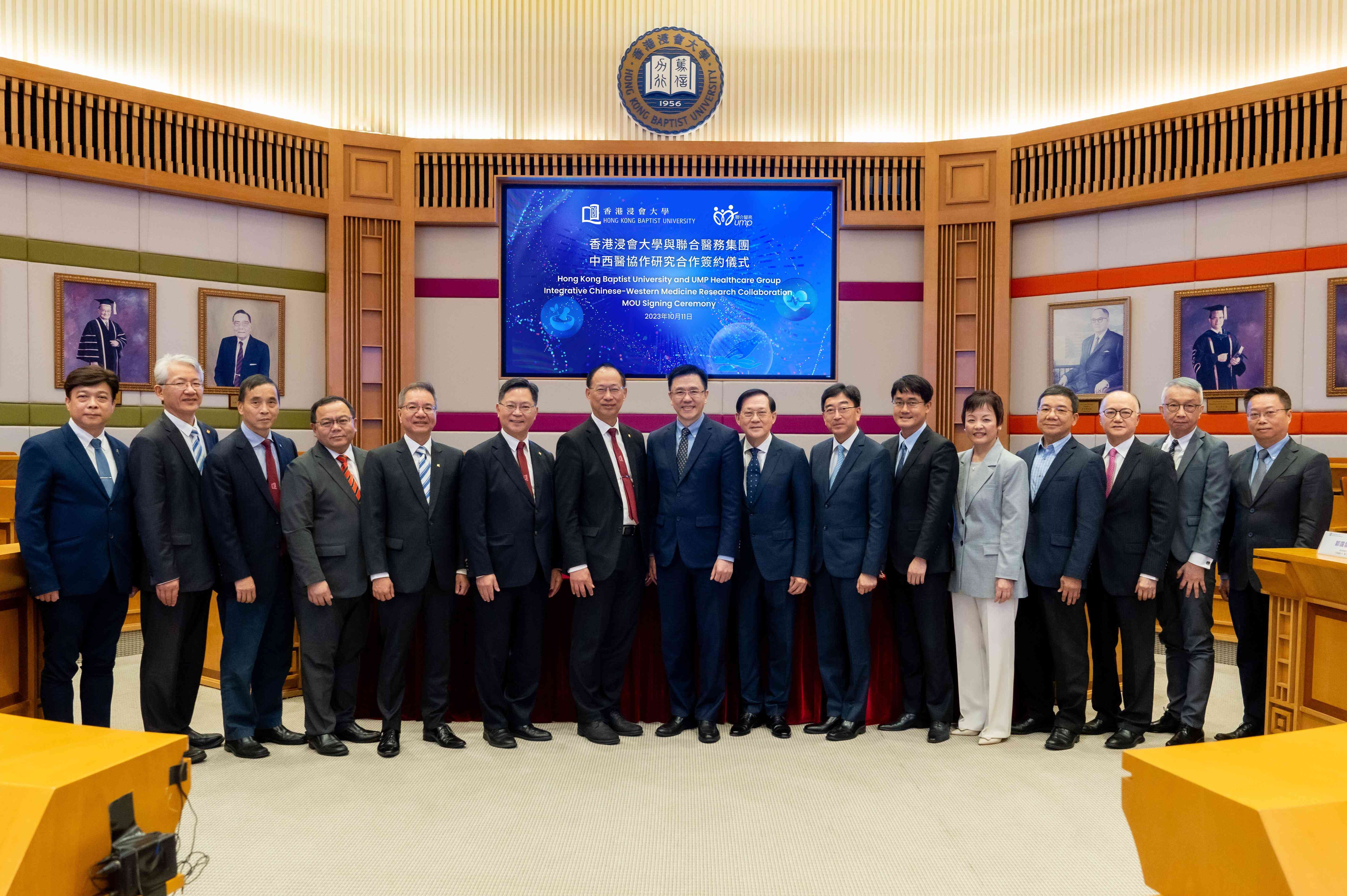Press Release
HKBU and UMP Healthcare sign MOU on integrative Chinese-Western medicine research collaboration
Wednesday, 11 October 2023
Hong Kong Baptist University (HKBU) and UMP Healthcare Group (UMP) signed a Memorandum of Understanding (MOU) today (11 October) which marks the beginning of their strategic partnership in exploring potential models of integrative Chinese-Western medicine by research collaboration. By providing scientific data support and developing innovative technologies for integrative Chinese-Western medicine, it offers the prospect of achieving the best clinical diagnosis and treatment effects for the benefit of patients.
Under the MOU, the “Integrative Chinese-Western Medicine Research Collaboration” will be launched with the objective of initiating multiple clinical and translational research projects in different healthcare areas, such as oncological treatment, through studies on their efficacies and safety. The collaboration will explore the development of innovative treatment protocols through Chinese-Western medicine consultation and collaboration, and the study of the scientific approach of integrative Chinese-Western medicine to offer the best treatment results for patients.
HKBU is the pioneer of Chinese medicine education and research in Hong Kong and has rich experience of providing Chinese medicine clinical services. The University was selected by the HKSAR Government as the contractor for the service deed of Hong Kong's first Chinese Medicine Hospital, dedicated to providing quality medical services to the public through the collaboration with the HKSAR Government, academia and the industry. On the other hand, UMP is one of the largest private healthcare service networks in Hong Kong which offers a comprehensive range of healthcare services. UMP has made every effort throughout the years to promote medical education and clinical research by sharing experiences, offering exchange platforms, and supporting research.
The MOU was signed by Professor Alexander Wai, President and Vice-Chancellor of HKBU, and Dr Sun Yiu Kwong, Chairman of UMP. The signing ceremony was honoured by the presence of Professor Sun Dong, Secretary for Innovation, Technology and Industry of the HKSAR Government as witness. Dr Ko Wing-man, Member of the Executive Council, Professor Chan Wing-kwong, Member of the Legislative Council, Professor Lyu Aiping, Vice-President (Research and Development) cum Dean of Graduate School of HKBU, Professor Terence Lau, Interim Chief Innovation Officer of HKBU, Mr Alfred Sit, Senior Advisor to the President and Vice-Chancellor of HKBU, Professor Bian Zhaoxiang, Associate Vice-President (Chinese Medicine Development) of HKBU, Dr Michael Sun, Co-Chief Executive Officer of UMP, Ms Jacquen Kwok, Co-Chief Executive Officer of UMP, and other guests also joined the ceremony.
In his address at the ceremony, Professor Sun Dong, Secretary for Innovation, Technology and Industry of the HKSAR Government, said: “HKBU has been actively promoting the development of Chinese medicine and the collaboration among the industries, academia and research institutes to provide quality Chinese medicine services for the public of Hong Kong. The University’s research collaboration with UMP will provide scientific and technical data as well as innovative technologies for integrative Chinese-Western medicine treatment in future. It will also expedite the integration of Chinese medicine theories and modern life science knowledge, and lay the foundation and benchmark for the development direction of Hong Kong’s first Chinese Medicine Hospital to be completed in 2025.”
Professor Alexander Wai, President and Vice-Chancellor of HKBU, said: “Our country has put a focus on the development of Chinese medicine. Our scientific research achievements also reflect HKBU's contribution to propel Hong Kong’s integration into the national development, inheriting and innovating Chinese medicine with standardisation and internationalisation. We look forward to building a healthy scientific research and exchange platform for Chinese and Western medicine through this collaboration. By strengthening the cooperation in technology development, data sharing and standardisation research, it will bring Chinese medicine towards a next level of quality enhancement and internationalisation.”
The research collaboration will explore a clinical model for the integrative Chinese-Western medicineto systematically understand how patients may benefit from this treatment approach, and to address current limitations in the field, namely the need for medical laboratory test and Chinese-Western medical referral. The outputs of the study will foster a closer understanding and cooperation between Chinese and Western medicine, and thus improve treatment outcomes.
The research programme will explore Chinese-Western medicine collaboration and consultation with a focus on oncology. It will start with colorectal cancer as the first project, and use Chinese medicine to reduce the side effects of cancer treatment including chemotherapy. It will focus on the effectiveness of Chinese medicine in cancer treatment in a scientific manner through the use of different biological tests, as well as research to identify and establish relevant biomarkers and parameters.
Dr Sun Yiu Kwong, Chairman of UMP, said: “UMP has always been attuned to the health needs of society and is dedicated to providing high-quality medical care. With an open-minded approach, we believe that collaborative research integrating Chinese and Western medicine can broaden the horizons of medical knowledge. We are pleased to support this clinical research with HKBU, exploring practical applications of different medical systems beyond academia, in order to provide evidence-based treatment options and better patient outcomes. Hong Kong has excellent professional oversight, a robust healthcare system, and government support for integrating Chinese and Western medicine, making it an ideal and reliable environment for research and practice. We believe the promising results of our collaborative efforts have the potential to establish Hong Kong as a globally recognised centre of excellence for integrated Chinese-Western medicine.”
Professor Terence Lau, Interim Chief Innovation Officer of HKBU, said: “Through this integrative Chinese-Western research collaboration, HKBU is eager to propel technology advancement in health and drug, and by a scientific and standardised approach, to explore, establish and evaluate the effectiveness of collaboration in diagnosis and treatment. By harnessing technological innovations to provide patients with more customised and precise diagnosis and treatment, I believe it will usher in a new milestone in this research collaboration.”
-End-


